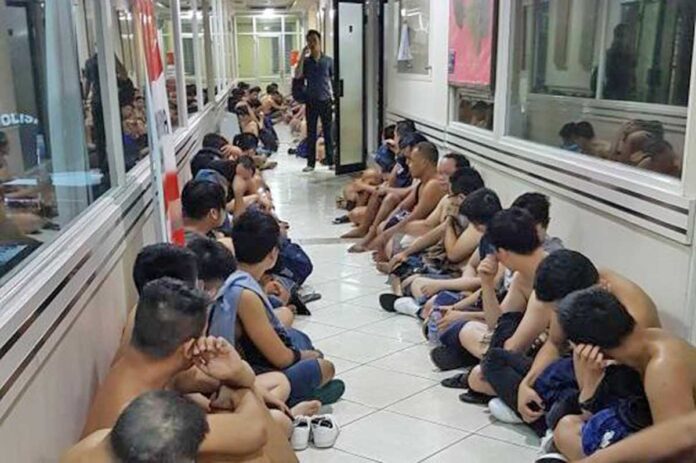LGBT+ people are under attack in Indonesia, the world’s fourth most populous nation and the world’s largest Muslim population. LGBT+ people have been under increased threat from harassment, discrimination, hate crimes and violence. Yet instead of protecting LGBT+ people from these attacks, police have ramped up arrests during raids of private events held by gay and lesbian people, using an anti-pornography law that bans promotion of gay or lesbian acts as the rationale for those raids.
On September 7, the international group Human Rights Watch (HRW) called on the Indonesian government to investigate a police raid on a private party attended by 56 gay men in Jakarta. HRW said the raid and subsequent arrests “highlight the threat to the rights of lesbian, gay, bisexual and transgender people in the country.”
On August 29, police forcibly broke up a party held at a hotel. Nine gay men were arrested on September 1 and charged with “facilitating obscene acts” under the country’s pornography law, which HRW says “discriminates against LGBT people.” HRW said that the charges “violate the rights to privacy, association, and equal protection of the law and should immediately be dropped.”
The other men in attendance at the party were designated by police as material witnesses against those being prosecuted.
Kyle Knight, senior LGBT rights researcher at HRW said, “This latest raid fits into a disturbing pattern of Indonesian authorities using the pornography law as a weapon to target LGBT people.”
He added, “The government has been inciting hostility toward LGBT people for several years, and there is no accountability for abuses such as police raids on private spaces.”
Under Article 296 of Indonesia’s criminal code, it is a crime for someone to make “an occupation or a habit of intentionally causing or facilitating any obscene act by others.”
But as HRW explains, the Jakarta raid is yet another example of Indonesian authorities unlawfully apprehending LGBT people in private spaces and then charging them with crimes. While there are no specific laws that specifically criminalize same-sex behavior, there are also no anti-discrimination laws protecting LGBT people.
Police have set up a special task force to investigate homosexual activity, of which the August 29 raid was part. According to the police report of the raid, a 31-officer police unit had been monitoring the private gathering and organized the raid.
In February, members of the Indonesian House of Representatives proposed a bill that would define homosexuality as deviant and require LGBT+ people to report to authorities for “rehabilitation.”
There has been a significant rise in anti-LGBT harassment and hate crimes over the past four years. HRW reports that these attacks “have resulted in the application of discriminatory clauses in the pornography law to target LGBT people for arrest and prosecution.”
Indonesia’s 2008 Law on Pornography prohibits the “creation, dissemination or broadcasting of pornography containing deviant sexual intercourse,” which it defines to include: sex with corpses, sex with animals, oral sex, anal sex, lesbian sex, and male homosexual sex. Article 36 of the Pornography Law, which criminalizes facilitating obscene acts for a commercial purpose, has a maximum penalty of 10 years in prison. According to HRW, “police use the law as a pretext for arbitrary raids and arrests, and courts have found gay men in private gatherings guilty under the law.”
A group of activists, including LGBT organizations, attempted to challenge the law in the Constitutional Court in 2009. The court refused to hear the case.
HRW cites instances of dozens of gay men being arrested, charged and convicted under the law since 2017. All the arrests took place at parties, clubs or gyms. None involved actual pornography.
HRW reports that in January 2020, the mayor of Depok, a city in West Java, ordered police to raid private residences to look for “immoral acts” and “prevent the spread of LGBT.” The National Human Rights Commission said such rhetoric from public officials increases the risk of persecution of LGBT people.
In response to the September 1 arrests, HRW issued a statement saying, “Privacy rights are a fundamental protection that underlie everyone’s physical autonomy and identity and include protections for private adult consensual sexual behavior.”
HRW also said, “Indonesian police should halt arbitrary raids on private spaces, investigate those that have taken place, and punish those who took part in the raids and those responsible in their chain of command.”
The group also stated that “Indonesian parliament should also substantially revise the proposed new criminal code to meet international human rights standards. It contains articles that will violate the rights of LGBT people. Since same-sex relationships are not legally recognized in Indonesia, this provision effectively criminalizes all same-sex conduct.”
HRW’s Kyle Knight said, “The combination of exploiting the discriminatory pornography law and a lack of accountability for police misconduct has proved to be both dangerous and durable. So long as the government permits police raids on private gatherings under a discriminatory law, it will fail to curb anti-LGBT harassment and intimidation.”
The United Nations Human Rights Council has previously called on Indonesian authorities to release people detained on the basis of their sexual orientation and combat anti-gay stigma in the country.
